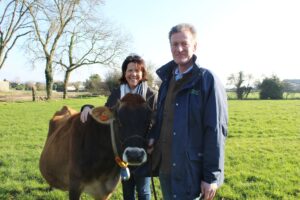
Alasdair Crosby reflects on the special theme of this issue of RURAL magazine
In each issue of RURAL, we have a ‘special theme’ of several articles on different aspects of the same subject. In the Spring issue, with Covid still very much in mind, we concentrated on ‘natural health. In this current issue, we have selected as a theme: ‘education and the environment’.
This choice was partly derived from the fact that teenagers in their final two years at school seem to be perpetually burdened with tests leading up to A-Levels and then, probably, university followed by the onset of adult life. Increasingly, it seems, ‘education’ means the assimilation of facts, followed by their successful regurgitation on demand at examination time. Education, both primary and secondary, seems to have become much more serious and less joyous than ever before.
Indeed, it might prepare students for the modern world in which they live, but not to inspire them to question the world in which they live.
In the ‘Welcome’ page of this issue of the magazine, I ask readers to consider the question: ‘What is an educated adult? How should school education be structured in the best interests of pupils so as to round their character and moral compass in preparation for adulthood? And what help towards achieving this would be an appreciation of the natural environment and knowledge of basic food production and some gardening and agricultural skills?’
Three cheers for such initiatives in Jersey as the RJA&HS’s ‘Cultivate’ programme and for the ‘Sprouts’ farm school – both covered in this present issue of the magazine – and three cheers for any initiative that brings children closer to the authentic and natural and away from the digital and insubstantial.
At a time of great social change and the oft-repeated slogan ‘Build Back Better’ in the post-pandemic world, this might also be a time for ‘building back education better’ as well.
The objective of producing an educated young adult should surely be the provision of a moral compass and the rounding of character, rather than simply stuffing the student full of facts.
I am something of a fan of the writings of Glenn Arbery, the principal of Wyoming Catholic College in the USA. Quoting from his college’s ‘philosophical vision’ as recorded on the college’s website, he writes:
‘In an age when individuals are encouraged to believe they are sovereigns over their private worlds, the curriculum looks outward to perennial shared realities, both in nature and in the riches of culture.
‘WCC’s calling, its charge as a college, is to ennoble its students, to prepare them for the heroism and humility they will need in order to bear witness to the complex nature of the truths they learn. Throughout their four years, on horseback or backpacking in the Tetons, directing a seminar or defending an argument, they take their turns as leaders….
‘The college is devoted exclusively to providing its students with a true liberal education, which aims at an intrinsic rather than extrinsic end, is general rather than specialised, prepares a person for leisure rather than work, and creates a free man capable of leading a good life.’
My second quotation is from the late John Seymour, better known as an early proponent of themes such a localisation and self-sufficiency. In his novel ‘Retrieved from the Future’, he describes, in supposedly the not too distant future, school education re-starting after a period of extreme social disruption, strife and chaos:
‘[Children] were not so much taught, as helped to read and write and do arithmetic, but their education was based on handicrafts, arts, agriculture. The aim was that every child should leave school with at least a working knowledge of all the crafts that were worth practising, and of agriculture and stockmanship, but also with a first-class knowledge of one chosen craft.
‘Our aim- the ideal for which we were to strive …. was the person who could produce his family’s food from his own holding and at the same time turn his hand to one skilled craft, to produce superbly some article that his neighbours wanted, and was, withal, a cultured person.’
Education both for Glenn Arbery and for John Seymour, suggest elements that could be used to advantage if indeed we are going to ‘build back better’ and to give our children a strong formation ‘in the permanent things’ so as to keep them safe and happy in an age of moral relativity, which contributes much to the present uncertain world.
* In our next (Autumn) issue, RURAL will have a special theme of ‘the built environment’. Comments and contributions welcomed




